U.S. Policies Created the Immigration Problem. Scapegoating Immigrants Makes It Worse.
Donald Trump and his GOP cohorts are using the issue to distract and divide U.S. workers while the ruling class exploits them.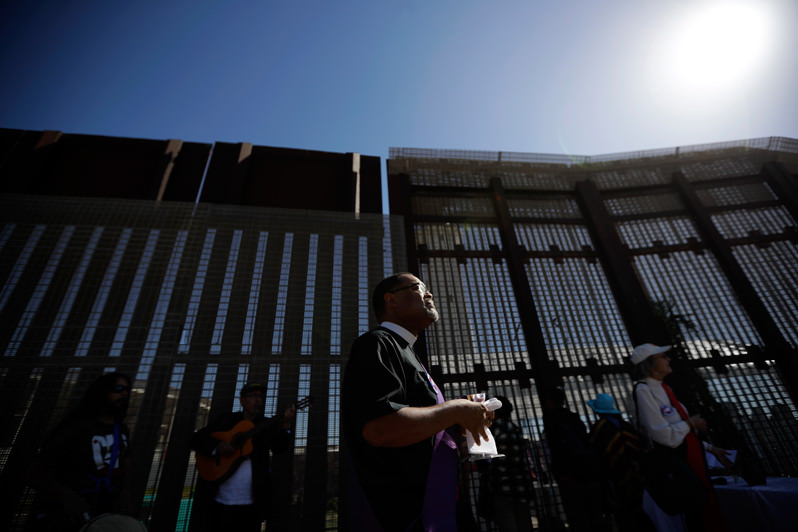 Gregory Bull / AP
Gregory Bull / AP
Gregory Bull / AP
Donald Trump railed against the North American Free Trade Agreement (NAFTA) during his presidential campaign. But he failed to mention how the measure forced vast swaths of Mexico’s farm population off their land and into the United States by flooding the country with cheap, subsidized, U.S. agricultural imports.
It was a curious deletion, given Trump’s immigrant-demonizing pledge to “build a [southern U.S. border] wall and make Mexico pay for it.” For Trump, the point of the wall is to stop the flow of supposedly dangerous and criminal Latinos into the U.S.
Another thing Trump left out is that the southern U.S. border wall is not new. It has been under construction since the Bill Clinton administration, thanks in no small part to NAFTA. As Todd Miller, author of “Border Patrol Nation,” noted last summer in Mother Jones, border barriers already exist:
In 1994 … the call for more hardened, militarized borders … came from US officials who anticipated the displacement of millions of Mexicans after the implementation of NAFTA. …
The expectations of those officials proved well justified. The ensuing upheavals in Mexico … were like the aftermath of a war or natural disaster. Small farmers couldn’t compete against highly subsidized US agribusiness giants like Cargill and Archer Daniels Midland. Mexican small-business owners were bankrupted by the likes of [Wal-Mart], Sam’s Club, and other corporate powers. Mining by foreign companies extended across vast swaths of Mexico, causing territorial conflicts and poisoning the land. The unprecedented and desperate migration that followed came up against what might be considered the other side of the Clinton doctrine of open trade: walls, increased border agents, increased patrolling, and new surveillance technologies meant to cut off traditional crossing spots in urban areas like El Paso, San Diego, Brownsville, and Nogales. …
Over the next 20 years, that border apparatus would expand immensely in terms of personnel, resources, and geographic reach, but the central strategy of the 1990s (“Prevention Through Deterrence”) remained the same. The ever-increasing border policing and militarization funneled desperate migrants into remote locations like the Arizona desert, where temperatures can soar to 120 degrees in the summer.
Trump’s nationalist indifference to Washington’s responsibility for generating the migration the nation frets over is commonplace in the U.S. When tens of thousands of Central American children piled up on the U.S. southern border in the summer of 2014, I heard numerous white “native” Americans say that their hearts went out to the “unaccompanied minors” trying to reach the U.S. “But,” the narrative went, “it’s not our problem. We’ve got nothing to do with it. It’s not our job to fix it.”
Such reflexive disassociation omits Uncle Sam’s critical role in the devastation of lives and communities abroad. Latino immigration to the U.S. has everything to do with Washington, D.C., and NAFTA is just one part of how. The 2005 U.S.-led Central American Free Trade Agreement (CAFTA) has brought the same misery NAFTA spread in Mexico to campesino communities in Honduras, El Salvador and Guatemala.
The neoliberal “free trade” deals (really, investor rights) that Trump lambasted for costing “forgotten Americans” their jobs have undermined the livelihoods of Central Americans, helping push them to attempt ever more dangerous crossings into the wealthy superpower up north.
READ: Bill Clinton Laid the Groundwork for Trump’s Ugly Immigration Policies
It isn’t just about agricultural exports. In Mexico and Central America, as in the world over, U.S.-led “free trade” agreements have resulted in government enterprises being privatized, the deregulation of corporations and steep cuts in social spending and environmental oversight. “Add to this the displacement of communities by foreign mining projects and the drastic U.S.-led militarization of the War on Drugs with accompanying violence,” historian William Blum noted nearly three years ago, and you have a “perfect storm of suffering followed by the attempt to escape from suffering.”
The racist, mass-incarcerationist U.S. drug war is also part of what generates the gang carnage that compels so many Mexicans and Central Americans to take desperate measures to escape—or at least to get their children out.
Another key U.S.-led push factor is climate change, which is negatively affecting the production of coffee and other crops in Central America. Here again, the superpower’s fingerprint (or perhaps its footprint) is clear. Among large nations, the U.S. remains far and away the world’s biggest carbon emitter on a per-capita basis. No nation has spewed more carbon into earth’s atmosphere than the United States. No nation has invested more heavily and powerfully in the political, ideological and military promotion and defense of the global carbon- and growth-addicted profits system. U.S.-led “free trade” agreements restrict the ability of governments to protect livable ecology. And no national government has done more to deep-six serious international efforts to reduce global carbon emissions than the one in Washington, D.C.
There is also the long and ugly U.S. history of enforcing and sustaining the impoverishment and torture of Latin America by backing and allying with right-wing regimes that crush movements for democracy and social justice. As historian Greg Grandin explains in “Empire’s Workshop,” “U.S. allies in Central America during Reagan’s two terms [in the 1980s] killed over 300,000 people, tortured hundreds of thousands, and drove millions into exile.” Lavish funding, training and equipment from Washington fueled this epic bloodshed. Victims were murdered and maimed as punishment for—and warnings against—participation in popular struggles to redistribute land and improve working and social conditions for peasants and workers in Guatemala, El Salvador and Honduras.
In 2008 and early 2009, Manuel Zelaya, Honduras’ democratically elected president, irked Washington by raising the hated specter of national self-determination and social justice. He provoked the U.S. empire by doing things like increasing the minimum wage, giving subsidies to small farmers and instituting free education. A graduate from the notorious U.S. Army School of the Americas (now called the Western Hemisphere Institute for Security Cooperation) led the coup that overthrew him in 2009. The hope-killing Honduran junta was backed by the “change”-promising Obama administration, which funded, equipped and worked with the bloody and repressive coup regime in subsequent years.
If not for this long and ongoing record of U.S. intervention on behalf of savage inequality, mass poverty, violence, environmental degradation and authoritarian rule in Central America, tens of thousands of severely distressed juveniles from the region would not have fled in desperation to the Yankee empire’s southern border in the summer of 2014.
Capitalists Like Cheap, Outwardly Obedient Labor
Along with the U.S. “push” factors behind Mexican and Central American immigration, there is also the “pull” factor of capitalists’ desire for cheap labor. Trump’s immigrant-bashing bombast bizarrely frames Mexican migration as a big rip-off of the U.S. by its southern neighbor, which sends what Trump calls its “worst people” (criminals and rapists) up to steal money, property and jobs.
You’d never know from the president’s nativist rhetoric that the U.S. employer class profits from immigrant laborers, who are willing to work largely without protest for low wages in difficult and low-status jobs in factories, fields, construction sites, homes, hotels, restaurants and packing plants across the nation.
Immigrants aren’t unnaturally obedient or authority-honoring people. But even a difficult, dirty and poorly paid U.S. job is a ticket out of developing-world misery and terror for many. That fact, and the fear of being detected and outed as an “illegal” in the case of undocumented workers, combines with language and cultural barriers to labor organizing to make Mexican and Central American workers unlikely to enlist in working-class struggles. It’s no great secret that capitalist bosses like that.
Debating Immigration’s Impact on the U.S.
There is a considerable and seemingly permanent argument among policy intellectuals about the effects of immigration on the United States. The right-wing, Republican-affiliated and white-nationalist side of this debate harps that immigrants are a drain on the U.S. economy and taxpayer—that they are deadening burdens who strain government services expenditure without contributing tax dollars or economic stimulus. The nativists also tend to argue that immigrant labor significantly reduces the wages of “native” U.S. workers. And with Trump’s ascendancy, the claim that many immigrants are criminals has gained special new currency in right-wing political culture.
Taxes and New Business Formation
Liberal and centrist researchers and activists counter these assertions, showing, for example, that:
● Undocumented immigrants in the U.S. contribute nearly $12 billion each year to state and local tax coffers in the form of income taxes, property taxes and sales or excise taxes.
● The average tax rate for undocumented immigrants in the country (8 percent) is higher than the rate paid by America’s top 1 percent (5.4 percent).
● Three-fourths of the “illegal” population pays into Social Security—a system they aren’t eligible to benefit from.
● Immigrants added $1.6 trillion to the U.S. gross domestic product in 2013.
● Immigrants started 28 percent of all new U.S. businesses, despite accounting for only 13 percent of the U.S. population in 2011.No Immigrant Crime Wave
There is no basis for the claim that undocumented immigrants—or any other part of the immigrant population—are disproportionately prone to criminal activity. A recent study by the venerable criminal and social justice research and advocacy group The Sentencing Project showed that the opposite is true: “Foreign-born residents of the United States commit crime less often than native-born citizens.” The report even suggests that “higher levels of immigration in recent decades may have contributed to [a] historic drop in [U.S.] crime rates.”
Wages: Correlation Is Not Causation
What about the claim that immigration depresses wages? It finds little support in serious social science research. A study conducted by the Economic Policy Institute seven years ago found solid evidence backing what the EPI called “broad agreement among academic economists” that “immigration has a small but positive impact on the wages of native-born workers overall.” Except for male U.S.-born workers with no high school degree in California (where immigrant competition caused a 2.9 percent relative real-wage decline between 1994 and 2007), the EPI found minimal justification for the idea that recent immigration has had a significant negative impact on U.S.-born workers’ incomes. Immigration, in fact, shows a modestly positive effect on “native” U.S. workers’ wages, the EPI determined.
The finding is less counterintuitive than it might at first seem. It is true that new immigrant workers add to local “unskilled” labor supplies. They feed what Karl Marx called the reserve army of labor, exercising downward pressure on wages at the bottom of the labor market. But those workers also consume goods and services, which creates jobs. Job creation tightens the job market and thereby increases the marketplace bargaining power of U.S.-born (and other) workers.
To say that immigrant workers are “stealing” jobs that would otherwise be available for U.S.-born workers is misleading. As labor economist Kim Moody has noted, many jobs immigrant workers “take” exist because “natural” U.S. population growth is too weak to fill them, because “racism blocks ‘native’ blacks, particularly young black men from some of them,” and because many “native” whites and blacks are unwilling to do jobs immigrants willingly perform.
Recent immigrant influxes to the U.S. have been correlated with wage stagnation and other forms of declining job quality. But correlation is not causation. A number of factors aside from immigration have combined to erode working and living standards for the U.S. working class over the last four decades. The culprits include the drastic decline of unionization, automation (technical displacement), the falling value of the minimum wage, the shredding of the social welfare safety net, and global trade and investment practices that “expose U.S. workers with low levels of education to competition from much lower wage workers around the globe.” As economist Joe Bivens has shown, these and other neoliberal developments reflect policy “failure by design.” They are part of a determined and many-sided, top-down effort to suppress U.S. wages at the bottom and concentrate wealth at the top.
Immigrant labor would have less or no depressive impact on “native” U.S. workers’ bargaining power if immigrant workers were accorded full civil and economic rights and if U.S. unions were strong and willing to aggressively organize them.
Deportation as Anti-Worker Sadism
For those who care about the work and living standards of the entire global working class, not just U.S.-born or naturalized workers, it is important to note that wage, job and living condition improvements experienced by workers who move from poor to wealthy countries are massive compared with any reductions native workers experience as a result.
The call to deport immigrants back to their lands of origin carries more than a hint of sadism. It amounts to sending people back to regions where it is impossible to make a decent living and where violence and terror are a constant threat. Should we send ex-offenders back to prison for an indefinite period because they become members of the reserve army of labor upon release? A better approach would be to end the ruthless “new Jim Crow” discrimination imposed on felons, organize them into unions and encourage and empower the criminal underclass to join with those not saddled by a criminal record and prison histories in fights for decent wages and conditions inside the U.S.
Americans who oppose immigration look ridiculous as well as mean-spirited when they fail to acknowledge the critical role their nation’s policies—and the broader world capitalist system those policies back—have played in the creating immigration. Those policies have forced millions of people in the global south to flee their homelands in search of minimally decent lives in rich nations that have grown wealthy largely through the exploitation of the vast, poor global periphery. “Immigration,” one Truthdig reader recently observed, “does not happen in a vacuum. It is not people just deciding to come here for a better life for themselves and their families. Our foreign policy has much to do with why people come here from countries below our southern border. … Unless you look at the economic and political policy of the US, you end up blaming victims and giving the perpetrators a free pass.”
As Blum explained: “It’s not that all these [Mexican and Central American] immigrants prefer to live in the United States. They’d much rather remain with their families and friends, be able to speak their native language at all times, and avoid the hardships imposed on them by American police and other right-wingers.”
‘This Whole Immigration Thing Is Not About Immigration’
The ultimate perpetrator is the profits system, at home and abroad. In a recent lecture on and against nationalism and scapegoating foreigners, renowned Marxist economist Richard Wolff cautions against wading too far into the weeds of the Trump-instigated immigration debate. Noting the indispensability of Mexican labor to the functioning of the U.S. economy, Wolff argues that the real function of the right-wing nativist demonization and scapegoating of immigrants in the U.S. is to deflect discussion and policy away from the fundamental question that most demands attention and remedy—capitalism’s underlying war on democracy, working people and the common good. It’s actually got nothing to do with whether immigration is good or bad for the U.S.
Do you really want to send all these people back? Mexicans in our culture do an incredible amount of work. Our construction industry is unthinkable without undocumented workers. … Who’s gonna do all the work in New York City? And at what rate of pay? If you have to pay Americans who aren’t of Mexican origin the kind of wage that those Americans think they ought to get, the price of everything is going to go nuts … [and] you’ll be real sorry that the Mexicans aren’t here anymore. And the businesses that depend on those Mexicans and the housing stock that’s gonna sit there empty with the rents not coming … and the loans that are based on those rents. …
None of this has been worked out. Mr. Trump has no clue … let alone a plan to deal with any of it. Because … this whole immigration thing is not about immigration. … Immigration became exciting [in the U.S. as in Europe] not because it is the key to our economic situation. … What’s [really] going on here is that the American economy is in trouble. Capitalism isn’t working for the majority of American people … and that’s true of the British people, and the French people and the Greek people, etc. These societies are not working real well. And when societies begin to break down, when their problem gets to the point where we are at, you face a kind of existential crisis. There are gonna be voices raised, saying, “It’s the system.” That’s what I do. That’s why I’m here. To tell you it’s the system. And I’m not the only one.
When you have a moment when a system is in crisis, it’s got to come up with an explanation for its problems that lead to actions that can be taken that leave the system out of the conversation. That’s what immigration is for. …
It’s easy to show that immigrants do as many good things as they do any kind of problem. … Like anybody else, they’re a mixed bag. But are they the problem that’s gonna fix our situation? Not even close. If they stay or don’t stay, our problems will remain.
Building on a richly bipartisan policy record of nativist border control, Trump and his Republican cohorts are using the immigration issue like a matador’s cape to distract, divert and divide U.S. citizens and workers while the ruling class continues to gore them with murderous impunity. While defense of immigrant worker rights is essential, those of us on the left would do well to remember that, at the end of the day, it’s the capitalism, stupid.
Your support matters…Independent journalism is under threat and overshadowed by heavily funded mainstream media.
You can help level the playing field. Become a member.
Your tax-deductible contribution keeps us digging beneath the headlines to give you thought-provoking, investigative reporting and analysis that unearths what's really happening- without compromise.
Give today to support our courageous, independent journalists.
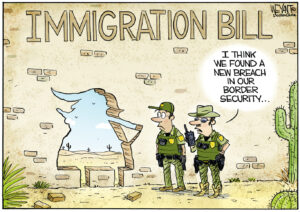
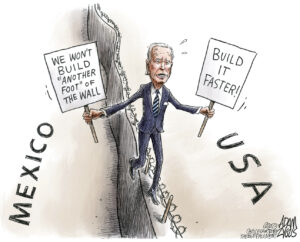
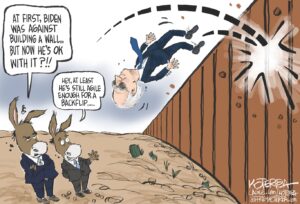
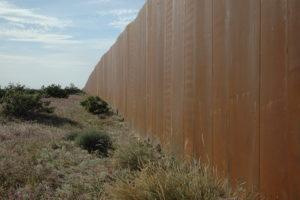

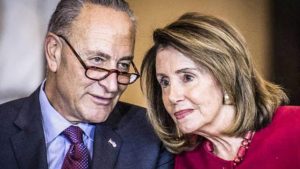
You need to be a supporter to comment.
There are currently no responses to this article.
Be the first to respond.